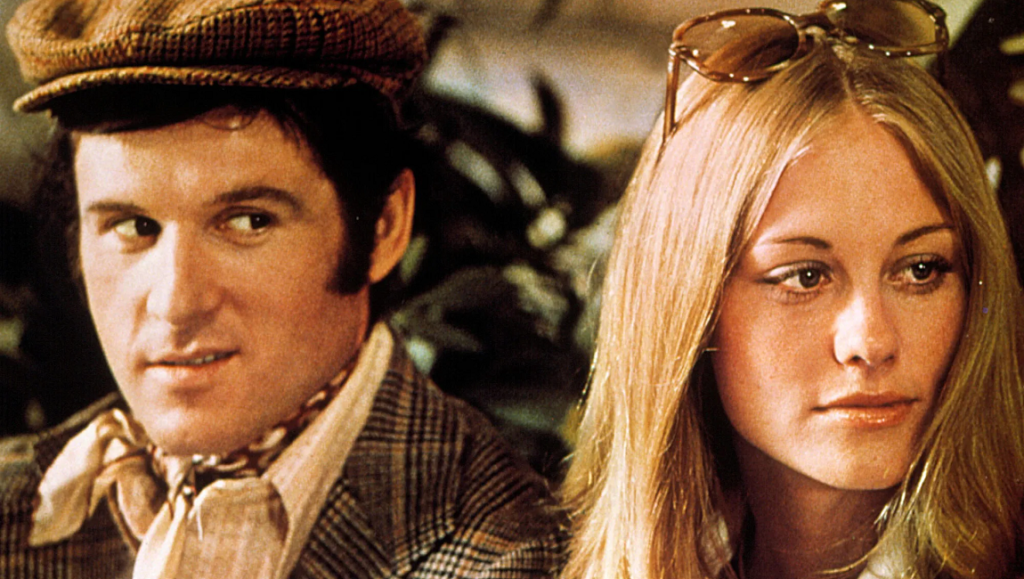If the arc of the moral universe indeed bends toward justice, then there just might have been a sliver of proof in the sold-out screening of Elaine May’s The Heartbreak Kid at the Brooklyn Academy of Music last month. The infinitely quotable Neil Simon script filtered through May’s effortless comic direction turns effervescent when watched with a full house that is laughing, gasping, and cringing all around you. This experience is a far cry from the first time I saw the film: alone at the height of quarantine via a YouTube upload maxed out at 360p. Sadly, despite the heartwarming BAM screening (a one-off), the latter remains one of the very few ways to catch it, a disheartening fate for a film once popular enough to garner multiple Academy Award nominations. But things are indeed looking up despite The Heartbreak Kid’s quagmire of distribution rights, as it looks like we’re finally seeing the pot of critical reassessment of May’s legacy go from a low simmer to a roil, so fervent it’s spilling over the stove top. The once contrarian take that May is the superior director to emerge from Nichols and May (her being the comic talent of the duo was patent) is starting to finally gain significant ground.
Despite Nichols and May’s origins — once an improv duo so popular they hosted the Emmy’s — there’s no great reason to drag the man through this. Those looking for some heat should dig up Jonathan Rosenbaum’s fantastic Chicago Reader review of The Graduate, where he uses The Heartbreak Kid as a cudgel; juxtaposing May’s serrated edge to Nichols’ butter knife. What’s fascinating here is precisely how grim and cutting The Heartbreak Kid is given its placement as May’s mainstream-friendly sophomore feature designed to show she could play ball in a more controlled environment after the fiasco of A New Leaf — May famously sued to have her name taken off her feature debut after seeing the studio cut. The controlled environment comes courtesy of a Neil Simon script that’s locked, loaded, and packed to the gills with memorable lines. Look up the original short story “A Change of Plan” by Bruce Jay Friedman, and you’ll find a wry, breezy and forgettable tale of a ridiculous man abandoning his wife on their honeymoon to chase a young college student halfway across the country. Simon’s part of the adaptation loads up on whip-smart dialogue and tightens the screws on structure, while May brings it to sardonic life with her improvisational directorial style.
May’s biting Chicago improv chops run wild here, as scene after scene between pre-implosion newlyweds Lenny (Charles Grodin) and Lila (Jeannie Berlin) carry the snappy give and take of Nichols and May routines. Her keen ear for cringe comedy has the studied acuity of a math-rock band, as she directs a mind-bending flow of awkward conversational rhythms with the most naturalistic flair. Meanwhile, it may be hard to imagine Grodin playing the lead in The Graduate, (Rosenbaum points out he was initially cast for it), but he is right at home as Lenny donning a rictus of regret to wearily deliver gems like: “No, honey, don’t do it. Don’t put a Milky Way in somebody’s mouth when they don’t want it.” May’s daughter, Berlin, plays the comedic counterweight, the woefully in-love Lila who is grating in flashes, but endearing enough to underline Lenny’s absurd overreactions and fundamental cruelty. This awfulness manifests in his obsession with the young student Kelly (Cybill Shephard), who’s staying nearby with her parents. The subtext raging underneath is that we opened the film on a Jewish wedding and Hava Nagila, and close on one in Minnesota amidst, as Friedman writes, “strange blond people with great Scandinavian profiles.”
Lenny’s grim alienation exiled into America’s wintery heartland in the final act is where the film hits its darkest tones and meaty substance, presaging the menacing romantic desperation of Joan Micklin Silver’s Chilly Scenes of Winter, as well as the harrowing circling of the drain of May’s masterwork Mikey & Nicky. It’s a remarkably suave tonal shift that finds the film’s comedic beats entering a brutal deadpan like a broken drum machine. We’re well past the fun and games of Miami Beach, life has gotten morose, but the jokes just keep coming: “There’s no insincerity in those potatoes, there’s no deceit in the cauliflower. This is a totally honest meal,” Lenny blathers while failing to find common ground with his future WASP in-laws. On the one hand, this piece-de-resistance line is fantastically inane, but there are grounds to take it as a serious expression of his deluded ambitions. In an earlier scene, he tries to pull quiet dignity from his “humble” American order of a burger and coke, while drawing disgust at the “excess” of Lila’s double egg salad sandwich. What’s unspoken here is that, for Lenny, Lila’s Jewishness is just “too much”; the question he seems to be battling is: “Why can’t she seem to sublimate it as I do?” And here comes the kicker: after all the self-censure and castigation, this side of America, with their “honest meals,” would happily pay him off just to leave their Minnesota home and never come back. As we close things out with Lenny desperately alone at his own reception, having traded everything away for a seat there, and humming the song that once symbolized his love, a classic Elaine May line comes to mind: “It’s suicidally beautiful.”
Part of Kicking the Canon – The Film Canon.


Comments are closed.